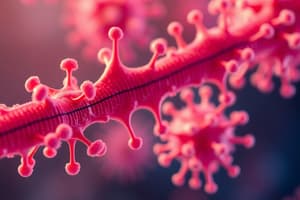Podcast
Questions and Answers
Which of the following is the correct definition of an 'antagonist'?
Which of the following is the correct definition of an 'antagonist'?
- A ligand that has an intrinsic activity of 1.
- A ligand that binds to a receptor and causes a biological response.
- A ligand that prevents the effects of an agonist. (correct)
- A ligand that binds to a receptor and has no effect.
What is the effect of a reversible competitive antagonist on a log dose response curve?
What is the effect of a reversible competitive antagonist on a log dose response curve?
- It causes a decrease in the maximum response.
- It has no effect on the curve.
- It shifts the curve to the left.
- It shifts the curve to the right. (correct)
What is the effect of a non-competitive antagonist on a log dose response curve?
What is the effect of a non-competitive antagonist on a log dose response curve?
- It causes a decrease in the maximum response.
- It shifts the curve to the right.
- It shifts the curve to the left.
- It has no effect on the curve. (correct)
Which type of antagonist binds to the same site as the endogenous ligand?
Which type of antagonist binds to the same site as the endogenous ligand?
What is the main difference between reversible and irreversible antagonists?
What is the main difference between reversible and irreversible antagonists?
What is the median effective dose (ED50)?
What is the median effective dose (ED50)?
What is the difference between therapeutic index and therapeutic window?
What is the difference between therapeutic index and therapeutic window?
Which of the following receptor types is regulated by a desensitized state with higher affinity for the agon?
Which of the following receptor types is regulated by a desensitized state with higher affinity for the agon?
Which type of receptor is characterized by containing receptor subunits around a 'central pore' that also acts as the ion channel?
Which type of receptor is characterized by containing receptor subunits around a 'central pore' that also acts as the ion channel?
Which receptor type 'receives' and 'transmits' signals through receptor tyrosine kinases?
Which receptor type 'receives' and 'transmits' signals through receptor tyrosine kinases?
Which of the following is true about receptor tyrosine kinases (RTKs)?
Which of the following is true about receptor tyrosine kinases (RTKs)?
Which of the following is true about Growth receptor binding protein 2 (Grb2)?
Which of the following is true about Growth receptor binding protein 2 (Grb2)?
Which of the following is true about Ras?
Which of the following is true about Ras?
Which of the following is true about nuclear receptors?
Which of the following is true about nuclear receptors?
Flashcards are hidden until you start studying




